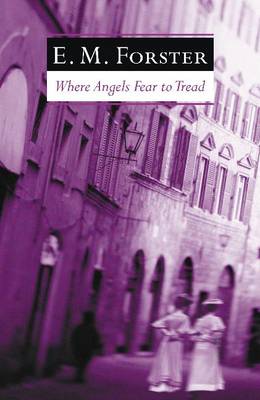Reviewed by brokentune on
I love Forster's writing. So, much so that to celebrate it I got myself a whole new set of lovely, matching editions of his novels recently.
Where Angels Fear to Tread was his first novel (published in 1905), and re-reading it this time I can see how this is very much a first novel, and why it has never impressed me on previous reads. You see, I came to Forster by way of Howards End, his fourth novel (published in 1910), and that reading experience set the bar vary, VERY high for any other book that was to follow, especially any other book by Forster.
This time, I read the book from a much altered perspective on life, but I still found the plot rather stilted and the characters simply unbearable - apart from Miss Abbott. Forster's message - which is quite daring for its time! - gets a little lost in the characters' bickering. Sure, there are some signs of great character study and an underlying satire of English and Italian society, but the characters are also really annoying. A satire is something I want to enjoy reading, the people in this story I just wanted to shove off the train.
There was one scene, however that I absolutely adore:
“You are wonderful!” he said gravely.
“Oh, you appreciate me!” she burst out again. “I wish you didn’t. You appreciate us all—see good in all of us. And all the time you are dead—dead—dead. Look, why aren’t you angry?” She came up to him, and then her mood suddenly changed, and she took hold of both his hands. “You are so splendid, Mr Herriton, that I can’t bear to see you wasted. I can’t bear—she has not been good to you—your mother.”
“Miss Abbott, don’t worry over me. Some people are born not to do things. I’m one of them; I never did anything at school or at the Bar. I came out to stop Lilia’s marriage, and it was too late. I came out intending to get the baby, and I shall return an ‘honourable failure’. I never expect anything to happen now, and so I am never disappointed. You would be surprised to know what my great events are. Going to the theatre yesterday, talking to you now—I don’t suppose I shall ever meet anything greater. I seem fated to pass through the world without colliding with it or moving it—and I’m sure I can’t tell you whether the fate’s good or evil. I don’t die—I don’t fall in love. And if other people die or fall in love they always do it when I’m not there. You are quite right: life to me is just a spectacle, which—thank God, and thank Italy, and thank you—is now more beautiful and heartening than it has ever been before.”
She said solemnly, “I wish something would happen to you, my dear friend; I wish something would happen to you.”
“But why?” he asked, smiling. “Prove to me why I don’t do as I am.”
She also smiled, very gravely. She could not prove it. No argument existed. Their discourse, splendid as it had been, resulted in nothing, and their respective opinions and policies were exactly the same when they left the church as when they had entered it.
There is an understatement in that scene that makes it lovely, sad, and very critical at the same time. And the fact that it is Miss Abbott, the woman who is expected to fall in line with expectations of her more qualified peers, who is - without having to shout it from the rooftops - the wiser and more worldly of the characters, just puts Forster way ahead of his time. Those aspects I really love about the book, but they just do not come to the fore in Where Angels Fear to Tread.
Instead, we get to meet a lot of fools.
For the barrier of language is sometimes a blessed barrier, which only lets pass what is good. Or—to put the thing less cynically—we may be better in new clean words, which have never been tainted by our pettiness or vice.
Reading updates
- Started reading
- 17 May, 2018: Finished reading
- 17 May, 2018: Reviewed
- Started reading
- Finished reading
- 17 May, 2018: Reviewed
